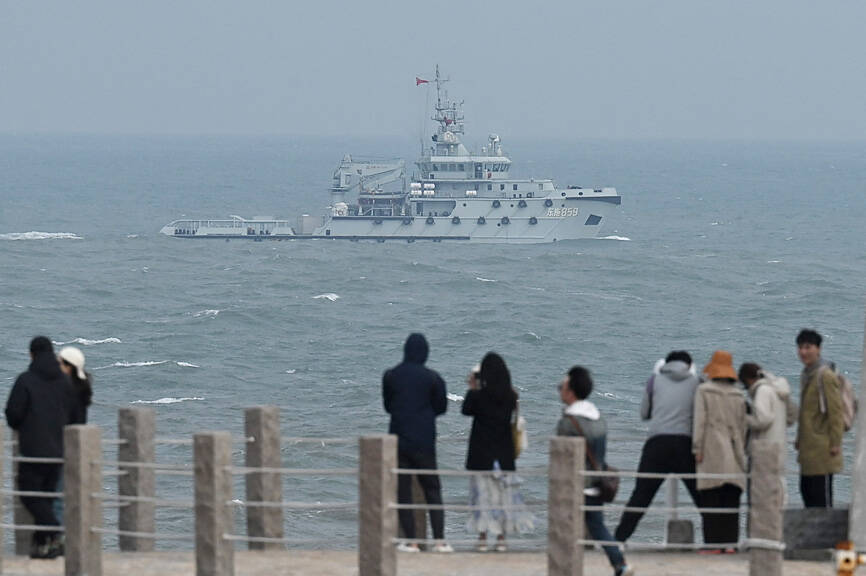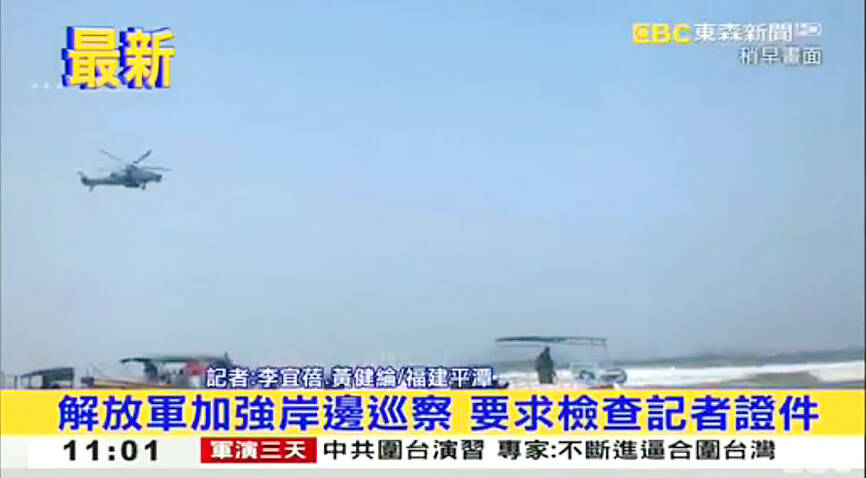EBC News (東森新聞) has not sought government assistance to retrieve two of its reporters who remain in custody in China after filming Chinese People’s Liberation Army (PLA) exercises earlier this month, a source said yesterday.
They were covering the PLA’s “united sword” drills around Taiwan from April 8 to Monday last week.
CONFRONTATION

Photo: AFP
On the second day of the drills, the reporters on Pingtan in China’s Fujian Province, the Chinese island closest to Taiwan proper, were establishing a connection with the news anchor when they were approached by a PLA soldier asking to see their credentials.
The soldier could be heard in the footage saying: “I just need to make sure you’re not a spy.”
EBC yesterday said the reporters are safe and have been in daily communication with the news division.

Photo: Screen grab from YouTube
They are in Xiamen “conducting business” and do not have plans to return at the moment, it said.
‘RESTRICTED RESIDENCE’
However, a person with knowledge of the matter said the reporters were taken into custody by Chinese authorities and were under “restricted residence.”
Although EBC said they have been in contact with the reporters, their actual status is unknown, the source said, adding that the government believes they are being kept from leaving Xiamen.
Their families have not contacted the Mainland Affairs Council or the Straits Exchange Foundation to help secure their release, they said.
DISAPPEARED
Unauthorized filming of PLA activities can result in serious repercussions.
Morrison Lee (李孟居), an unpaid adviser to Pingtung County’s Fangliao Township (枋寮), went missing in 2019 after sending photographs and footage of Chinese paramilitary police amassing on the border between Shenzhen and Hong Kong to the Fangliao mayor.
The state-run China Central Television later broadcast footage of Lee confessing to working as a spy. He was sentenced to one year and 10 months in prison, and deprived of political rights for two years.
Although his sentence is over, he has still been unable to return to Taiwan.
The cases should serve as a reminder to Taiwanese reporters that they must be careful when working in China, which does not have freedom of the press, the source said.
Additional reporting by Lin Hsin-ying

A preclearance service to facilitate entry for people traveling to select airports in Japan would be available from Thursday next week to Feb. 25 at Taiwan Taoyuan International Airport, Taoyuan International Airport Corp (TIAC) said on Tuesday. The service was first made available to Taiwanese travelers throughout the winter vacation of 2024 and during the Lunar New Year holiday. In addition to flights to the Japanese cities of Hakodate, Asahikawa, Akita, Sendai, Niigata, Okayama, Takamatsu, Kumamoto and Kagoshima, the service would be available to travelers to Kobe and Oita. The service can be accessed by passengers of 15 flight routes operated by

Alain Robert, known as the "French Spider-Man," praised Alex Honnold as exceptionally well-prepared after the US climber completed a free solo ascent of Taipei 101 yesterday. Robert said Honnold's ascent of the 508m-tall skyscraper in just more than one-and-a-half hours without using safety ropes or equipment was a remarkable achievement. "This is my life," he said in an interview conducted in French, adding that he liked the feeling of being "on the edge of danger." The 63-year-old Frenchman climbed Taipei 101 using ropes in December 2004, taking about four hours to reach the top. On a one-to-10 scale of difficulty, Robert said Taipei 101

MORE FALL: An investigation into one of Xi’s key cronies, part of a broader ‘anti-corruption’ drive, indicates that he might have a deep distrust in the military, an expert said China’s latest military purge underscores systemic risks in its shift from collective leadership to sole rule under Chinese President Xi Jinping (習近平), and could disrupt its chain of command and military capabilities, a national security official said yesterday. If decisionmaking within the Chinese Communist Party has become “irrational” under one-man rule, the Taiwan Strait and the regional situation must be approached with extreme caution, given unforeseen risks, they added. The anonymous official made the remarks as China’s Central Military Commission Vice Chairman Zhang Youxia (張又俠) and Joint Staff Department Chief of Staff Liu Zhenli (劉振立) were reportedly being investigated for suspected “serious

Taiwanese and US defense groups are collaborating to introduce deployable, semi-autonomous manufacturing systems for drones and components in a boost to the nation’s supply chain resilience. Taiwan’s G-Tech Optroelectronics Corp subsidiary GTOC and the US’ Aerkomm Inc on Friday announced an agreement with fellow US-based Firestorm Lab to adopt the latter’s xCell, a technology featuring 3D printers fitted in 6.1m container units. The systems enable aerial platforms and parts to be produced in high volumes from dispersed nodes capable of rapid redeployment, to minimize the risk of enemy strikes and to meet field requirements, they said. Firestorm chief technology officer Ian Muceus said